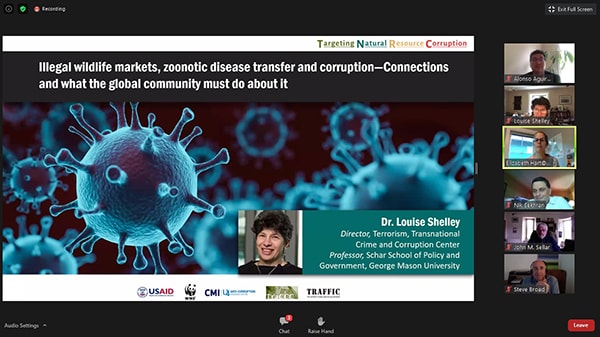In This Story
Originally published on June 24, 2020
As the international community works to end COVID-19, it must also work to prevent the next pandemic, and that begins with controlling corruption and reigning in illicit wildlife trafficking, a panel of international security experts said Tuesday.
The 90-minute discussion, hosted by the Targeting Natural Resource Corruption project and moderated by Louise Shelley, director of the Terrorism, Transnational Crime, and Corruption Center (TraCCC) at the Schar School for Policy and Government, turned up new insights about how illegal wildlife markets facilitate the transfer of infectious diseases—which, as we have learned, can quickly become pandemics. More than 200 audience members tuned in for the discussion.
During the COVID-19 pandemic, a renewed interest has been found in the spread of zoonotic diseases and what the root causes are. Zoonotic diseases are those that transmit from animals to humans.
“The actual probability of a zoonotic disease found in animal populations—whether wildlife or domestic—and transferred to people, is not that improbable.” said Nik Sekhran, chief conservation officer for the World Wildlife Fund. “The impacts are massive, as we’re seeing with the current pandemic, and it is also true that we tend to oversimplify the root causes retrospectively. This we cannot afford to do.
“One of the root causes,” said Sekhran, “is corruption.”
There are other root causes as well, such as climate change, which exacerbates the preexisting problems of animal trade and the spread of disease.
“Climate is going to be influencing vectors, pathogens, hosts,” said Alonso Aguirre, chair of the Department of Environmental Science and Policy at George Mason University. “Of course, there is a link between COVID-19 and climate change with these ‘wet’ markets, with illegal wildlife trade, with corruption. All of these have to be considered to address the problem in a transdisciplinary way.”
“So what are the future trends?” Aguirre asked. “Expect more pandemics. The way we are causing globalization, the way we are expanding into wildlife habitats, increasing the illegal wildlife trades, all trying to provide for the billions of people around the planet…We are adding more conflicts between wildlife and humans in many ways,” said Aguirre, “and climate is key.”
Climate certainly is a driving factor that worsens the problem, but international cooperation is also lacking, said Steve Broad, executive director of TRAFFIC, a non-governmental organization that focuses on animal and plant trading. “There are conflicting policies, there is often low resource allocation in terms of regulation enforcement…There is weak compliance pressure between countries in terms of countries holding each other to account. There is inconsistent enforcement—[it is] relatively low-risk for offenders.
“It is seen as a low-risk, high-reward crime,” Broad said, “and this is a business heavily influenced by corruption.”
So how do we regulate legal—and end illegal—wildlife trafficking to stem the spread of infectious diseases? “It’s probably not going to be the police themselves,” said John M. Seller, senior advisor to the Global Initiative Against Transnational Organized Crime. “Unfortunately, the reality is that customs around the world are pretty much overwhelmed…A lot of cargo that leaves such countries isn’t properly inspected—in fact it may not be inspected at all.”
“People aren’t lobbying for governments to do something about organized crime the way that they maybe are in relation to wildlife,” said Seller. “And I think we also need to recognize, post-pandemic, there are going to be other issues related to policing that politicians, NGOs, other research groups may be placing their focus on, such as Black Lives Matter. There’s a risk that some of the issues that we’re talking about today may be lost within that.”
“Corruption has a key role to play in this pandemic,” said Shelley. “It’s not the sole cause, but it is an aggravating problem of illicit trade, and it’s there at every element of cross-border movement, of things that are not supposed to be traded. Therefore, we need to think about it, and as we focus on a much more multi-disciplinary perspective—how to approach health issues, conservation of the environment, reservation of wildlife—we must also integrate the discussions of corruption in wildlife trade that have too long been distant from these issues.”
Hopefully, the discussion of the issues around illegal wildlife markets, and the spread of zoonotic diseases will not fade before these issues are resolved. Otherwise, the experts suggested, the next pandemic may be sooner than you think.

